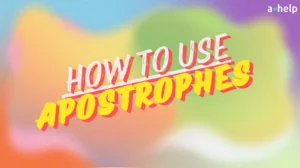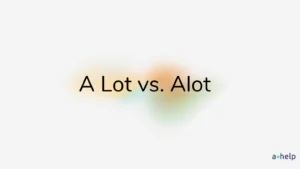Sometimes, when you are writing or typing really fast, you may write ‘your welcome’ instead of ‘you’re welcome’. And if you sit in front of such a phrase for long enough, you will probably catch yourself wondering: is it written correctly? How should I write this properly? To be prompt, we can say right away that the only right way to say it is you’re welcome. But if you want to learn why exactly it is said like that and look at a few examples maybe, then stick with us to the end of this guide.

✅ AI Essay Writer ✅ AI Detector ✅ Plagchecker ✅ Paraphraser
✅ Summarizer ✅ Citation Generator
The Difference Between Your vs. You’re
First things first, let’s break down the difference between “your” and “you’re.” “Your” is a possessive adjective, meaning it shows ownership. For instance, you might say, “Is this your book?” On the other hand, “you’re” is a contraction of “you are.” So, when you say “you’re welcome,” you are essentially saying “you are welcome.”
✅Correct Way to Say It.
Imagine you’ve just helped a friend with their homework. They thank you, and you respond with “you’re welcome.” Here, you are acknowledging their gratitude by saying, “You are welcome.”
❌Incorrect Way to Say It.
Suppose someone writes, “Your welcome to join us for lunch.” This sentence is incorrect because “your” suggests ownership, not the act of welcoming. The correct sentence should be, “You’re welcome to join us for lunch.”
Why Is It Important?
For starters, using correct grammar helps in clear communication. Yet, it also shows attention to detail. Whether you’re writing an email, a paper for school, or a message to a friend, proper usage of “your” and “you’re” makes a good impression and helps avoid any possible miscommunications.
Tips to Remember
If this is something you are struggling to remember properly, then we have a few helpful tips that might make it much easier for you.
- Substitute “you are” in place of “you’re.” If the sentence makes sense, “you’re” is correct.
- Remember that “your” shows possession. Ask yourself if something belongs to someone.
- Practice by writing a few sentences using both “your” and “you’re.”
UR Welcome and U R Welcome in Slang: What Does It Mean?
In informal text conversations, you might come across “ur welcome” or “U R welcome” as slang abbreviations. Why are these variations popular? Well, to be honest, it is because they help save time typing and don’t require so much concentration on proper rules and spelling. Let’s take a look at what each version means and when to use them.
When you see “ur” written in lowercase without a space, it typically stands for “your.” However, in the context of “ur welcome,” it functions as a shorthand for “you’re.” On the other hand, “U R,” written in capital letters with a space, explicitly means “you are.”
Both “ur welcome” and “U R welcome” can substitute for “you’re welcome” in a casual setting.
Note that using such slang is generally accepted only in informal communications, such as texting family and friends. They add a touch of casualness and informality that suits personal conversations. When it comes to professional or more formal contexts, it’s best to stick with the correct full spelling: “you’re welcome.”
Wrapping Up
By now, you should have a clearer understanding of when to use “your” and “you’re.” Remember, it’s all about ownership versus contraction. Keep practicing, and soon you won’t have to think twice about which one to use.
FAQ
Follow us on Reddit for more insights and updates.





Comments (0)
Welcome to A*Help comments!
We’re all about debate and discussion at A*Help.
We value the diverse opinions of users, so you may find points of view that you don’t agree with. And that’s cool. However, there are certain things we’re not OK with: attempts to manipulate our data in any way, for example, or the posting of discriminative, offensive, hateful, or disparaging material.